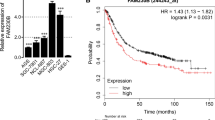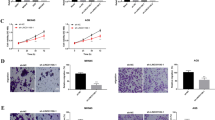Abstract
Long non-coding RNA (lncRNA) TP73 antisense RNA 1 (TP73-AS1) has been characterized as an oncogenic lncRNA in GC. However, by analyzing The Cancer Genome Atlas (TCGA) dataset we observed the downregulation of TP73-AS1 in GC. In addition, TP73-AS1 is predicted to interact with microRNA-223-5p (miR-223-5p), which is also a critical player in cancer biology. This study was therefore carried out to investigate the roles of miR-223-5p and TP73-AS1 in gastric cancer (GC) and to explore the interactions between them. In this study, 68 GC patients were included as research subjects. Expression of miR-223-5p and TP73-AS1 was analyzed by RT-qPCR. Dual-luciferase assay and overexpression experiments were used to analyze gene interactions. Transwell assays were used to analyze cell invasion and migration. We found that miR-223-5p was upregulated and TP73-AS1 was downregulated in GC and they were inversely correlated. Altered miR-223-5p and TP73-AS1 expression predicted poor disease-specific survival. Dual-luciferase assay showed that miR-223-5p may bind TP73-AS1 and overexpression experiments showed that miR-223-5p overexpression downregulated TP73-AS1 in gastric cancer cells. Cell invasion and migration assays showed that miR-223-5p could promote the invasion and migration of gastric cancer cells, while TP73-AS1 could inhibit the invasion and migration of gastric cancer cells. In addition, miR-223-5p attenuated the effects of TP73-AS1 overexpression. Therefore, miR-223-5p may target TP73-AS1 to promote the invasion and migration of gastric cancer patients.





Similar content being viewed by others

Data availability
All data generated or analyzed during this study are within this published article.
References
Sitarz R, Skierucha M, Mielko J, et al. Gastric cancer: epidemiology, prevention, classification, and treatment. Cancer Manag Res. 2018;10:239–48.
Bray F, Ferlay J, Soerjomataram I, et al. Global cancer statistics 2018: GLOBOCAN estimates of incidence and mortality worldwide for 36 cancers in 185 countries. CA Cancer J Clin. 2018;68(6):394–424.
Katai H, Ishikawa T, Akazawa K, et al. Five-year survival analysis of surgically resected gastric cancer cases in Japan: a retrospective analysis of more than 100,000 patients from the nationwide registry of the Japanese Gastric Cancer Association (2001–2007). Gastric Cancer. 2018;21(1):144–54.
Tan MC, Balakrishnan M, Graham DY. Gastric cancer worldwide except Japan[M]//Gastric Cancer. Singapore: Springer; 2019. p. 17–28.
Fuccio L, Eusebi LH, Bazzoli F. Gastric cancer, Helicobacter pylori infection and other risk factors. World J Gastrointest Oncol. 2010;2(9):342–7.
Mocellin S, Verdi D, Pooley KA, et al. Genetic variation and gastric cancer risk: a field synopsis and meta-analysis. Gut. 2015;64(8):1209–19.
Ali SM, Sanford EM, Klempner SJ, et al. Prospective comprehensive genomic profiling of advanced gastric carcinoma cases reveals frequent clinically relevant genomic alterations and new routes for targeted therapies. Oncologist. 2015;20(5):499–507.
Ferreira HJ, Esteller M. Non-coding RNAs, epigenetics, and cancer: tying it all together. Cancer Metastas Rev. 2018;37(1):55–73.
Anastasiadou E, Jacob LS, Slack FJ. Non-coding RNA networks in cancer. Nat Rev Cancer. 2018;18(1):5–18.
Cao M, Jiang Y, Tang Y, et al. The crosstalk between lncRNA and microRNA in cancer metastasis: orchestrating the epithelial-mesenchymal plasticity. Oncotarget. 2017;8(7):12472–83.
Zhang W, Zhai Y, Wang W, et al. Enhanced expression of lncRNA TP73-AS1 predicts unfavorable prognosis for gastric cancer and promotes cell migration and invasion by induction of EMT. Gene. 2018;678:377–83.
Wang Y, Xiao S, Wang B, et al. Knockdown of lncRNA TP73-AS1 inhibits gastric cancer cell proliferation and invasion via the WNT/β-catenin signaling pathway. Oncol Lett. 2018;16(3):3248–54.
Li X, Zhang Y, Zhang H, et al. miRNA-223 promotes gastric cancer invasion and metastasis by targeting tumor suppressor EPB41L3. Mol Cancer Res. 2011;9(7):824–33.
In H, Solsky I, Palis B, et al. Validation of the 8th edition of the AJCC TNM staging system for gastric cancer using the national cancer database. Ann Surg Oncol. 2017;24(12):3683–91.
Tang Z, Li C, Kang B, et al. GEPIA: a web server for cancer and normal gene expression profiling and interactive analyses. Nucleic Acids Res. 2017;45(W1):W98–W102.
Mazor G, Levin L, Picard D, et al. The lncRNA TP73-AS1 is linked to aggressiveness in glioblastoma and promotes temozolomide resistance in glioblastoma cancer stem cells. Cell Death Dis. 2019;10(3):246.
Li S, Huang Y, Huang Y, et al. The long non-coding RNA TP73-AS1 modulates HCC cell proliferation through miR-200a-dependent HMGB1/RAGE regulation. J Exp Clin Cancer Res. 2017;36(1):51.
Author information
Authors and Affiliations
Corresponding author
Ethics declarations
Conflict of interest
The authors declare that they have no competing interests.
Ethical standards
The study was performed in accordance with the Declaration of Helsinki and obtained the approval from the Ethics Committee of The First Affiliated Hospital of Xi'an Jiaotong University. All animal experiments were approved by the Animal Care and Use Committee of The First Affiliated Hospital of Xi'an Jiaotong University.
Additional information
Publisher's Note
Springer Nature remains neutral with regard to jurisdictional claims in published maps and institutional affiliations.
Rights and permissions
About this article
Cite this article
Liu, J., Wang, H. & Liao, X. MicroRNA-223-5p targets long non-coding RNA TP73 antisense RNA1 to promote the invasion of gastric cancer. Human Cell 33, 676–682 (2020). https://doi.org/10.1007/s13577-020-00349-3
Received:
Accepted:
Published:
Issue Date:
DOI: https://doi.org/10.1007/s13577-020-00349-3



